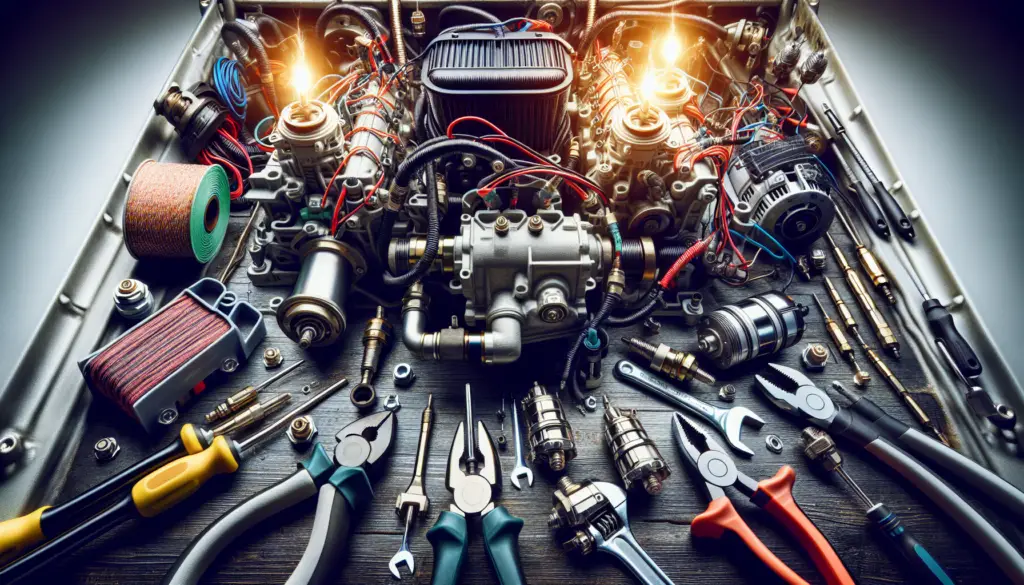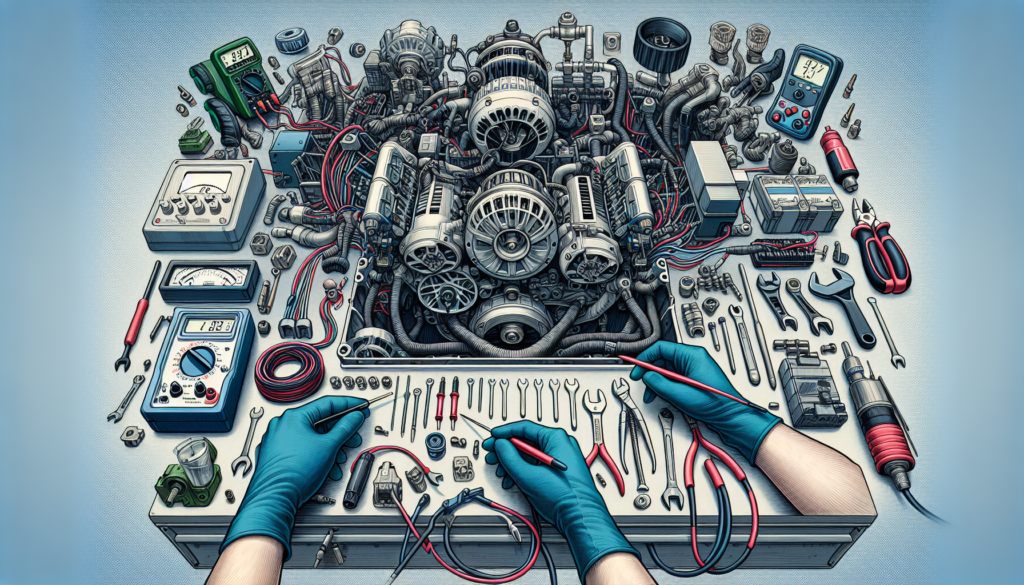Seasoned sailors and newcomers alike understand the importance of a well-maintained boat, and the role of boat engine electrical systems is undeniably crucial. What you might not know is how to keep these systems clean and effective. This article provides straightforward, detailed instructions to help you clean and maintain your boat’s engine electrical systems like a true pro. Perfecting these skills is not just about preventing potential malfunctions; it’s about ensuring you can enjoy those smooth, worry-free adventures on the open water you’ve been dreaming of.

Understanding Your Boat’s Electrical System
Owning a boat can bring you unprecedented joy, but it also requires some essential know-how and maintenance responsibilities – one of those being your boat’s electrical system. This system is fundamental to the efficient running of your boat, powering everything from your navigation systems to your boat’s motor.
Basics of a boat’s electrical system
Let’s start from the basics, shall we? A boat’s electrical system is primarily designed to distribute and manage electricity that is generated either from shore power supplies, generators, or the boat’s engine. Like any other powered devices, your boat requires various electrical elements to ensure smooth sailing.
Components of the electrical system
Your boat’s electrical system comprises several components, crucial among them being the battery, alternator, and inverters. Others include the wiring systems, circuit breakers, fuse blocks, and switches. It’s essential to familiarize yourself with these components as they all play a part in running your boat smoothly.
How the boat’s electrical system works
In simple terms, your boat’s electrical system works on a ‘supply and use’ basis. The battery powers the electrical components, and the alternators recharge the battery as your engine operates. The energy gets stored in the battery and then distributed through the electrical system in your boat to power the different devices.
Getting Started with Boat Engine Maintenance
Before jumping into the real deal of maintaining your boat engine’s electrical system, there are a few things you need to get in order.
Tools needed for boat engine maintenance
For effective maintenance, you need the right tools. A basic set would include a voltmeter, multimeter, wire strippers, a battery terminal cleaner and wrenches, and various fuses. It’s also wise to keep an assortment of nuts, bolts, and screws on hand.
Safety precautions and measures
Safety cannot be overemphasised when dealing with an electrical system. Make sure you switch off all devices before you begin. Don a pair of insulated gloves and eye protection. Always ensure your work area is dry to prevent any electrical accidents.
Finding the boat’s engine and electrical components
Locating the boat’s engine room and the different electrical components is a lot easier than it sounds, simply refer to your boat’s manual. Every boat comes with one, and it is essential once you want to understand where the key components of the boat’s electrical systems are.
Routine Cleaning of Boat Engine Electrical Systems
Cleaning your boat’s electrical system is important to avoid buildup of rust and dirt that could hamper the functioning of your boat.
Steps to clean your engine’s electrical system
Before cleaning, you need to disconnect the battery to prevent any electrical mishaps. Wrenches are commonly used to disconnect the battery terminals. After this, you can clean the battery terminals and other necessary components with a cleaning solution.
Cleaning products for electrical systems
Several cleaning products exist in the market that can be used specifically for boat electrical systems. They remove corrosion and protect electrical contacts. Just make sure to use products that are specifically designed for electrical systems and won’t cause any damage.
Benefits of regular cleaning
Regular cleaning ensures your engine remains in top condition. It also allows you to spot any small problems before they escalate into costly repairs.
Inspecting the Wiring and Cables
Maintaining the health of your boat’s wiring system is crucial as faulty wiring can lead to various problems including short circuits and fires.
Identifying worn out or damaged wires
Inspecting your boat’s wiring should be part of your regular maintenance routine. Look for wear and tear or any signs of cracking, fraying or corrosion on the wires.
How to safely change the boat’s wiring
It’s simple, you need to remove the old, damaged wires before installing new ones. Make sure to follow a diagram if available, or use colored tape to mark wires for easier replacement.
Proper wiring techniques for continual maintenance
Using marine-grade wiring and weather-resistant connectors helps prevent corrosion and other damage. Regular inspections and timely replacement of faulty components can save you from bigger issues in the future.

Maintenance of the Battery System
Having a reliable battery is critical to the functioning of your boat. Hence, its upkeep is equally significant.
Checking the boat’s battery
Regularly inspect your battery for any signs of leakage or corrosion on the terminals. Additionally, ensure your battery holds a charge and powers all electrical systems appropriately.
Cleaning the battery terminal
To clean the terminals, you’ll need a battery terminal cleaner or a brush. This will remove any corrosion that may be present, improving the battery’s performance and longevity.
Testing the battery’s voltage
For this, you’ll need a voltmeter or multimeter. Both devices measure the battery’s amount of electrical energy, ensuring it is within the appropriate range.
Sensors and Switches Maintenance
Sensors and switches play a vital role in the smooth running of your boat’s electrical systems.
Identifying different sensors and switches
Recognising the sensors and switches is the first step towards their maintenance. They can typically be found in the boat’s console, engine room or even hidden in various locations throughout the boat.
Cleaning and maintaining switches
Switches need to be free of any dust or corrosion. Cleaning them with a specific electrical cleaner can help keep them functioning smoothly.
Troubleshooting common sensor problems
Common issues with sensors might include malfunction due to dirt or damage, or instances where they fail to operate. Reading the user manual or seeking professional help is always a good idea to troubleshoot sensor-related issues.
Maintaining Circuit Breakers and Fuse Blocks
Circuit breakers and fuse blocks protect your electrical systems from damage due to overloads or short circuits.
Understanding the role of circuit breakers and fuse blocks
Circuit breakers and fuses essentially do the same task – they protect electrical circuitry by disrupting the flow of electricity when the current exceeds a specific level.
Checking and replacing fuses
To check if a fuse is faulty, remove it from the fuse block and inspect the wire inside. If the wire is broken, the fuse should be replaced with a new one of the same rating.
Maintenance tips for circuit breakers
For circuit breakers, routine checks for signs of wear or damage are essential. Regularly flipping them on and off can keep them functioning at their best.
Investigating Engine Performance
The performance of your boat’s engine is directly linked to your electrical system.
How engine performance relates to the electrical system
Essentially, your engine relies heavily on the electrical system to keep it going. Any issues with the electrical elements could contribute to poor engine performance.
Signs of electrical problems affecting engine performance
Should your engine be behaving unusually, it’s worth considering the electrical system as a possible culprit. Signs may include a starter that won’t engage or difficulty in starting your boat, among others.
Troubleshooting electrical issues related to engine performance
Using a multimeter to check the voltage of your battery, as well as checking the fuse blocks can pave the way to identifying issues impacting engine performance.
Troubleshooting Electrical Problems
Keeping an eye out and being able to troubleshoot electrical problems can save you time and unnecessary costs associated with extensive damages.
Identifying common boat electrical problems
Common issues to look out for could include continuous blowing of fuses, battery issues like fast discharging, low voltage or poorly performing electrical equipment.
Steps to troubleshoot electrical system issues
Isolate the system causing the problem, and use a multimeter or voltmeter to check the voltage and amperage. You should also check the connections and the general condition of the wires and terminals.
When to seek professional help
While you can handle basic troubleshooting and some repairs, complex issues should be left to professionals. If the problem persists despite your efforts, consider contacting a marine electrician to avoid risking further damage.
Preventive Measures and Regular Maintenance
In order to enjoy your boat without a hitch, preventive measures come into play and routine maintenance checks are imperative.
Knowing and understanding preventive measures
Preventive measures are key. Always make sure the systems are dry as moisture can cause issues in electrical systems. Using the right cleaning products and quality materials for installation can also go a long way in preventing problems.
Creating a regular maintenance schedule
Having a regular maintenance schedule enables you to nip potential problems in the bud. Inspecting and cleaning all electrical components, checking the battery, switches, and wires should be on your weekly or monthly schedule, depending on your usage of the boat.
Tips to prolong the life of your electrical system and engine
Familiarity with your boat and regular checks can help prolong the life of your systems. Always keep your electrical system clean and replace any worn-out or damaged components promptly. Remember, a little proactive care and attention can go a long way in ensuring longevity and performance of your precious boat.
In essence, understanding, cleaning and maintaining your boat’s electrical system can be a simple and rewarding process with the right knowledge and tools. Remember, safety first! So, it’s time to put on those gloves, grab your toolkit and ensure smooth sailing ahead. Happy boating!

